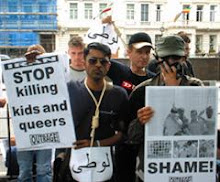The west is obsessed with Tehran's nuclear programme, but doesn't give a damn about human rights abuses.
Peter Tatchell
September 20, 2007 6:30 PM
The Islamic Republic of Iran has executed three more Arab political prisoners, just days after a visit from the UN High Commissioner for Human Rights, Louise Arbour. In further defiance of the UN and international law, four more Arabs face imminent execution.
There have been no protests from Britain, the EU or the UN. The UN's silence comes on top of the truly appalling vote by UN Human Rights Council to abandon its monitoring of human rights abuses in Iran.
The only thing the west seems to care about is Iran's nuclear programme. Human rights abuses do not concern Washington, London or Brussels. Nor do they concern President Hugo Chavez of Venezuela and President Robert Mugabe of Zimbabwe. Both men have warmly embraced the tyrant of Tehran, President Mahmoud Ahmadinejad.
The Arab League, the supposed defender of Arab peoples worldwide, is equally indifferent. It has refused to protest to Iran about the persecution of ethnic Arabs in the south-west of the country - the oil-rich region Tehran calls Khuzestan, but which the indigenous Arab peoples call al-Ahwaz.
While condemning Israel for abusing the Palestinian people, Arab states are silent about the abuse of fellow Arabs by the Iranian regime. The anti-imperialist left is also mute. Why the double standards? Palestinian Arabs get the support of progressives and radicals everywhere; Iranian Arabs get no support at all. They swing from nooses in public squares like cattle hanging in an abattoir. Does anyone care?
Ahwazi Arabs accuse Tehran of Persian chauvinism, racism and ethnic cleansing, as I previously revealed in Tribune. The response to that article from some Islamists, left-wingers and anti-war activists was to denounce me as racist and anti-Muslim. But how can it be Islamophobic or racist to defend Arab Muslims against Tehran's persecution?
Amnesty International has also expressed concern about the bloody repression and economic exploitation of Iran's Arab minority, as has Dr Karim Abdian of the Ahwaz Human Rights Organisation (AHRO). I recently interviewed Dr Abdian for my Talking With Tatchell TV programme, which you can watch here.
The execution of three Arabs last week is the latest in a series of barbaric hangings, designed to terrorise the Arab population into submission. Ten other Arabs are known to have been executed since December last year. Amnesty International and Human Rights Watch have condemned their trials as unjust and unfair.
In January this year, three UN special rapporteurs also voiced concerns about the way the trials were conducted. Their concerns confirm criticisms by one of Iran's leading human rights advocates, Emad Baghi. In a letter to the chief of the judiciary, Ayatollah Hashemi Shahroudi, he argued that the trials of Ahwazi Arabs were flawed, the charges baseless, and that the sentencing was based on a spurious interpretation of law.
The men hanged last week were Abdulreza Nawaseri, Mohammad Ali Sawari and Jafar Sawari. Charged with bombing the Zergan oilfields in 2005, they were executed secretly in prison using Tehran's sadistic slow strangulation method, deliberately designed to prolong the suffering of the victims.
The men denied all the charges during a summary one-day trial in which they were deprived of adequate legal representation and denied the opportunity to call witnesses in their defence. Their lawyers were not allowed to meet them and were not given time to read their files. When they subsequently complained about the conduct of the trial, five of the seven lawyers (all Arabs) were arrested and summoned to court on allegations that they had threatened national security.
Abdulreza Nawaseri, aged 32, was arrested in 2000 and sentenced to 35 years in prison. He was in jail at the time of the Zergan bombings and therefore could not have committed the attacks, which further suggests that these men were framed on false charges.
Brothers Mohammad Ali Sawari and Jafar Sawari had been in prison since 2005. They were initially accused of promoting Sunni Islam, which is a heinous crime in the sectarian Shia state of Iran. These charges were later supplemented with charges of bombing the Zergan oilfields. No evidence was produced to back up the charges.
Mohammad Ali, a 37-year-old teacher, was an English literature graduate. Some reports claim he was also accused of translating George Orwell's book, Animal Farm, into Arabic, with the aim of sparking an uprising. According to his family, there was no allegation of bombings in his file.
The men's execution prompted spontaneous anti-government demonstrations in Ahwaz. Security forces fired on the crowds. Reports suggest that one person was killed and 20 others wounded.
At least six more Arab political prisoners are facing imminent execution. Four of them are in Karoun prison. These prisoners include Hamzah Sawari, 20 years old, who is accused of giving unauthorised religious instruction in a local mosque, instigating worshippers against the state and displaying the Ahwazi flag in 2005. The other men scheduled to hang with him are Zamel Bawi, Abdulemam Zaeri and Nazem Boryhi. The charges against them have not been made public.
Two more Arabs, who were illegally handed over to Tehran by Syria, are also expected to be hanged. The UN High Commission for Refugees reports that the men were recognised refugees and therefore protected under international and Syrian law from removal to a country such as Iran where they could be at risk of torture and execution.
According to Daniel Brett, chair of the British Ahwazi Friendship Society:
The Iranian government is not only executing innocent men, it is killing or jailing entire families in its attempt to terrorise the Ahwazi Arab people. We know that the entire family of Ahwazi psychologist Dr Awdeh Afrawi have been executed, murdered or imprisoned; Dr Afrawi himself is currently dying in prison, being deliberately denied the medication he needs to survive.The Nasseri and Bawi tribes appear to be key targets, due to the fact that their lands are oil-rich and members of these tribes have been heavily involved in opposition to the government's land confiscation programme and its forced displacement of Arabs.
Contrary to Tehran's propaganda, most Arab movements in al-Ahwaz are not violent separatists. They primarily want non-discrimination, cultural rights, social justice and regional self-government - not independence.
If, however, Tehran continues to rebuff moderate, mainstream Arab opinion, there is a danger that many Arabs will turn to armed struggle and wage a full-scale national liberation war with the aim of outright independence. This would turn oil-rich al-Ahwaz into another zone of violent instability, with adverse global economic consequences as a result of diminished oil production and rising oil prices.
Quite rightly, most Arabs do not support a US attack on Iran. Military intervention would strengthen the position of the hardliners in Tehran; allowing President Ahmadinejad to play the nationalist card and, using the pretext of defending the country against imperialism, to further crack down on dissent. Many Ahwazis believe the route to liberation is an internal "people power" alliance of Iranian socialists, liberals, democrats, students, trade unionists and minority nationalities.
I have supported the Iranian people's struggle for democracy and human rights for four decades - first against the western-backed imperial fascist Shah and, since 1979, against the clerical fascism of the ayatollahs. Some anti-war leftists refuse to condemn the Tehran dictatorship and refuse to support the Iranian resistance; arguing that to do so would play into the hands of the US neocons and militarists. I disagree. Opposing imperialism and defending human rights are complementary, not contradictory.
Subscribe to:
Post Comments (Atom)

.jpg)
No comments:
Post a Comment